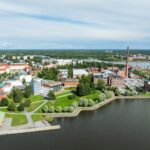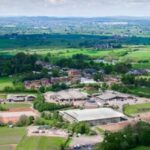Studying geology abroad
What is geology?
Geology is the science of the Earth’s structure, materials, and history. It looks at how rocks, minerals, landscapes, and natural processes develop over time. Geologists study forces like plate tectonics, erosion, and volcanic activity, as well as resources such as groundwater, oil, and minerals. By examining the Earth’s past, geology also helps us understand climate change, natural hazards, and the future of our planet.
The subject links together knowledge from chemistry, physics, biology, and geography. As a geology student, you might spend time analysing rock samples in a lab, using computer models to study earthquakes, or exploring mountains and coastlines to observe geological formations in the field.
Why study geology abroad?
Studying geology in another country gives you the chance to see Earth’s features first-hand. You could examine volcanic landscapes in Iceland, study fossils in the deserts of the United States, or explore mountain ranges like the Alps or Andes. These experiences allow you to connect what you learn in class with the natural world.
Learning abroad also means working with students and researchers from different cultures. This not only improves your communication and teamwork skills but also helps you see global geological challenges, such as resource management and hazard prevention, from multiple perspectives.
What you will study
Geology programs often mix classroom study with practical training. Topics you might cover include:
- Mineralogy and Petrology, focusing on minerals and rock formation
- Structural Geology, looking at the forces that shape the Earth’s crust
- Sedimentology and Stratigraphy, studying layers of rocks and sediments
- Paleontology, analysing fossils and the history of life
- Geophysics, applying physics to explore underground structures
- Volcanology and Seismology, examining earthquakes and volcanic eruptions
- Hydrogeology, understanding groundwater systems
- Geological Mapping and Field Skills, learning how to record and interpret features in nature
Many universities include fieldwork, research projects, or placements with geological surveys, mining companies, or environmental agencies.
Related subjects you might also like
- Earth Sciences
- Geography
- Environmental Science
- Geophysics
- Natural Resource Management
Articles related to agriculture, earth and environmental sciences
Accreditation
At undergraduate level, most students graduate with a Bachelor of Science (BSc) in Geology or Geoscience. Some institutions also offer combined degrees that link geology with subjects such as environmental science or physics.
For postgraduate studies, you can choose a Master of Science (MSc) or Master of Research (MRes) in Geology, Geoscience, or Earth Sciences. Specialisation options include volcanology, mineral exploration, hydrogeology, and petroleum geology. Students aiming for advanced research or academic work often continue to a PhD.
In several countries, geologists can apply for professional accreditation through geological societies or industry organisations, which may be important for certain career paths.
Careers
A geology degree can lead to many career opportunities. Some graduates work in natural resource industries, helping to locate and manage minerals, oil, or groundwater. Others focus on environmental geology, where they study land use, soil quality, or the risks of earthquakes and landslides.
Geologists are also needed in construction and engineering projects, advising on foundations, tunnels, and infrastructure safety. Those interested in research or teaching may work in universities, laboratories, or museums.
Beyond these paths, graduates can move into science communication, policy, or consulting. The analytical, research, and problem-solving skills developed in geology are valued worldwide, opening doors to international careers that help us better understand and protect the Earth.
Other subjects in agriculture, earth and environmental sciencesSign up to our regular email updates with advice on destinations, universities, scholarships and everything you need to prepare for studying overseas.
Sign up to our free emails now

